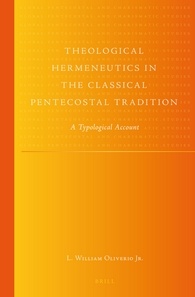Bill Oliverio: Theological Hermeneutics in the Classical Pentecostal Tradition
 L. William Oliverio, Jr., Theological Hermeneutics in the Classical Pentecostal Tradition: A Typological Account (Netherlands: Brill, 2012), ISBN 9789004280175.
L. William Oliverio, Jr., Theological Hermeneutics in the Classical Pentecostal Tradition: A Typological Account (Netherlands: Brill, 2012), ISBN 9789004280175.
I just finished reading L. William Oliverio, Jr., monograph, Theological Hermeneutics in the Classical Pentecostal Tradition: A Typological Account. In the first six chapters, Oliverio maps the historical development of Pentecostal theology through a taxonomy of five types of historical Pentecostal hermeneutics. Along with their illustrative exemplars, these are: 1. the “original classical pentecostal hermeneutic” (Charles F. Parham, William J. Seymour, Charles H. Mason, Garfield T. Haywood); 2. the “early evangelical-pentecostal hermeneutic” (Daniel W. Kerr, P.C. Nelson, Myer Pearlman); 3. the “contemporary evangelical-pentecostal hermeneutic” (Gordon Fee, Roger Stronstad, Robert Menzies); 4. the “contextual-pentecostal hermeneutic” (Amos Yong, James Smith, John Christopher Thomas, Kenneth Archer); and 5. the “ecumenical-pentecostal hermeneutic” (Cecil M. Robeck Jr., Veli-Matti Kärkkäinen, Frank Macchia, Simon Chan and Koo Dong Yun).
Oliverio concludes by proposing a theological hermeneutic he finds most congruent towards ongoing 21st century challenges to both the worldwide Pentecostal tradition and the broader Christian tradition. One weakness to his taxonomy is that he admittedly works largely from North American Classical Pentecostal historiography. However, the interdependence between globalisation and globally diverse local Pentecostalisms, would suggest that his taxonomy comprises sufficient broadness for assessing emerging and local Pentecostal hermeneutical models worldwide.
Oliverio argues that the “original classical pentecostal hermeneutic” marked the “beginning of a new Christian tradition.” He also contends that even as the early Pentecostal movement understood its apostolic calling as that of calling the whole Church back to the root of New Testament “Pentecostal” experience, it was thereby highly ecumenical in orientation and moreover— comprising a broad range of theological diversity.
The “early evangelical-pentecostal hermeneutic” later emerged through the influences of fundamentalism and modern evangelicalism, which led to a new stress on the inerrancy doctrine and creation of a “pentecostal scholasticism.” The “contemporary evangelical-pentecostal hermeneutic,” emerged in the 1970’s, largely via the Lukan scholarship debates. It signified a new Pentecostal reliance on Evangelical hermeneutical methodologies, for arguing Classical Pentecostal doctrines of Spirit baptism along with the evidential tongues doctrine. Hence, this era marked a newfound appreciation for historical-grammatical methods of exegetical methods, focusing on identifying authorial meanings of scriptural texts.
I find it important to note Oliverio’s observation that the “contemporary evangelical-pentecostal hermeneutic’s stress on authorial meaning was itself philosophically rooted to the Hirschian (E.D. Hirsch) author-centered hermeneutic theory. Meanwhile, the “contextual-pentecostal hermeneutic,” which emerged in the latter part of the 1990’s, followed the Gadamerian school of thought (Hans-George Gadamer; fusion of the reader’s linguistic and conceptual horizon with the horizon of the text). Hence, this Pentecostal hermeneutic has stressed the reader’s contextual situation (especially the cultural-linguistic context) towards readings of Scripture, and the formative role this context plays towards theologizing. Oliverio identifies this phase as demarking the beginning of a truly authentic Pentecostal manner of theologizing. Yet Oliverio laments the historical wedge that has developed between these two hermeneutics, which he seeks to address through themes emerging from the “ecumenical-pentecostal hermeneutic” and his proposed “hermeneutical realism.
Category: In Depth, Spring 2015


